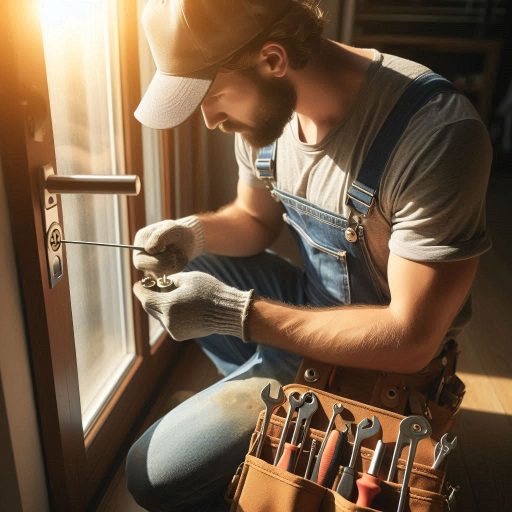Introduction
Preventing common lock issues is essential for maintaining security and convenience.
Locks protect our homes, businesses, and vehicles, ensuring safety for everyone.
When locks malfunction, they can create unnecessary stress and frustration.
Addressing these issues before they escalate saves time, money, and effort.
The most common lock problems people encounter include key jamming, sticky locks, and broken keys.
Key jamming often occurs due to dirt buildup or worn components.
Regular cleaning can help prevent this frustrating situation.
Sticky locks can result from inadequate lubrication or environmental factors.
Applying the right lubricant regularly can ensure smooth operation and longevity.
Additionally, broken keys are a frequent issue, often caused by excessive force or wear.
To avoid this, users should handle keys gently and replace them when showing signs of damage.
Another common issue is misaligned locks, which can occur due to settling structures or wear.
Ensuring proper installation and making necessary adjustments can help prevent this problem.
By understanding these common lock issues, individuals can take proactive measures to prevent them.
Regular maintenance, proper usage, and timely repairs can ensure that locks function effectively and securely for years to come.
Use a quality lock
Invest in a High-Quality Lock from a Reputable Brand
Preventing common lock issues starts with choosing the right lock.
Investing in a high-quality lock from a reputable brand is essential.
Well-known brands have established their reliability and durability over time.
They use superior materials and engineering, ensuring their locks withstand wear and tear.
High-quality locks often feature advanced technology that enhances security.
For example, some locks come with pick-resistant mechanisms.
These features make it much harder for intruders to bypass the lock.
Additionally, reputable brands offer warranties, providing peace of mind for your investment.
When selecting a lock, consider its intended use.
Different locks serve various purposes, such as residential, commercial, or automotive needs.
Residential locks may differ significantly from those designed for businesses.
A reputable brand can guide you in choosing the right lock for your specific needs.
Furthermore, a high-quality lock is often easier to maintain.
Quality locks typically resist rust and corrosion, ensuring longevity.
They may also come with instructions for proper care, helping you avoid future issues.
By investing in a reputable lock, you reduce the likelihood of encountering common problems.
Avoid Cheap Locks That May Easily Break or Malfunction
While it might be tempting to save money on locks, avoiding cheap options is crucial.
Cheap locks often lack the durability and security features of their higher-quality counterparts.
They can easily break or malfunction, leaving you vulnerable to lockouts or break-ins.
Cheap locks may use inferior materials, making them prone to wear.
Over time, these locks may not function correctly, leading to frustration and potential security risks.
You might find that a cheap lock becomes more expensive in the long run due to repairs and replacements.
Additionally, cheap locks often lack proper security features.
They may be easier to pick or tamper with, increasing the risk of theft.
Investing in a reliable lock can deter potential intruders and protect your home or business.
When purchasing locks, always prioritize quality over price.
Research brands and read customer reviews to gauge their reliability.
Don‘t hesitate to ask for recommendations from friends or professionals.
Their insights can lead you to trustworthy brands and products.
In review, preventing common lock issues begins with investing in high-quality locks from reputable brands.
These locks offer durability, advanced security features, and ease of maintenance.
Conversely, cheap locks may break or malfunction, compromising your safety and convenience.
By prioritizing quality and reliability, you ensure the security of your property and avoid unnecessary headaches.
Making informed choices when selecting locks will pay off in the long run, keeping your home or business safe and secure.
Remember, investing in quality is investing in peace of mind.
Read: Finding the Right Work-Life Balance as a Nail Tech
Keep your locks clean
Regularly Clean and Lubricate Your Locks to Prevent Dirt and Debris Buildup
Preventing common lock issues begins with regular cleaning and lubrication.
Dirt and debris can accumulate in locks over time.
This buildup can cause locks to jam or operate poorly.
To clean your locks, use a soft cloth to wipe the exterior.
This simple action removes surface dirt and grime.
You can also use compressed air to blow out dust and debris from the keyhole.
This method helps maintain lock functionality.
After cleaning, it’s essential to lubricate the lock.
Lubrication prevents friction and ensures smooth operation.
Regularly lubricating locks can extend their lifespan significantly.
Aim to clean and lubricate your locks every few months.
Use a Lock-Specific Lubricant to Ensure Smooth Operation
When lubricating locks, choose a lock-specific lubricant.
Common lubricants like WD-40 can attract dust and grime.
Instead, opt for graphite or silicone-based lubricants designed specifically for locks.
Graphite powder is an excellent choice for locks.
It provides long-lasting lubrication without attracting dirt.
To use graphite, simply sprinkle a small amount into the keyhole.
Then insert and turn the key a few times to distribute it evenly.
Silicone spray is another effective option for lubricating locks.
It creates a protective barrier against moisture and corrosion.
Spray a small amount directly into the lock mechanism.
Make sure to wipe away any excess to prevent buildup.
To prevent common lock issues, maintain your locks year-round.
Seasonal changes can affect how locks function.
In colder months, ice and snow can cause locks to freeze.
Regular maintenance helps you avoid these issues before they arise.
Additionally, check your locks periodically for signs of wear and tear.
Look for any rust or discoloration on metal parts.
If you notice any damage, address it promptly.
Ignoring minor issues can lead to more significant problems down the line.
When using your locks, handle them gently.
Avoid forcing keys into locks, as this can damage both the key and lock.
If your key feels stiff, stop and lubricate the lock before trying again.
Seek Professional Help When Needed
If you encounter persistent issues with your locks, consider seeking professional help.
A locksmith can identify underlying problems and provide effective solutions.
They can also recommend the best maintenance practices for your specific locks.
Professional locksmiths can perform comprehensive inspections and repairs.
They will ensure your locks operate smoothly and securely.
Regular professional maintenance can save you time and money in the long run.
All in all, preventing common lock issues requires regular cleaning and lubrication.
By cleaning your locks every few months and using lock-specific lubricants, you can maintain their functionality.
In addition, seasonal maintenance and gentle handling will further enhance your locks’ longevity.
If you experience persistent issues, consult a professional locksmith for assistance.
Prioritizing these practices will help you enjoy smooth, trouble-free locks for years to come.
Read: Steps to Become a Professional Pet Groomer in the USA
Avoid Forcing the Key
Do Not Force a Key into a Lock That Is Not Turning Easily
When a key does not turn easily in a lock, do not force it.
Forcing a key can damage both the key and the lock.
This damage may lead to costly repairs or replacements.
If you feel resistance while turning the key, stop and assess the situation.
Check if the key is inserted correctly.
Sometimes, a key may not align properly, preventing it from turning.
Inspect the lock for any visible signs of damage or dirt.
Dirt and debris can accumulate inside the lock, causing it to malfunction.
If you notice any dirt, avoid inserting the key further.
Forcing a key into a stubborn lock can lead to a broken key.
A broken key can become lodged in the lock, complicating the issue further.
Removing a broken key often requires professional assistance, adding time and expense.
Try Using Graphite Powder or a Silicone-Based Lubricant
Instead of forcing the key, try using graphite powder or a silicone-based lubricant.
These products can help ease the movement of the key.
They act as a barrier, reducing friction within the lock mechanism.
Graphite powder is a popular choice for lubricating locks.
It is a dry lubricant that prevents dirt accumulation.
Simply apply a small amount of graphite powder into the lock.
After applying the graphite powder, insert the key and turn it gently.
The key should move more freely if the lock is properly lubricated.
This method can resolve minor lock issues without damaging the mechanism.
Silicone-based lubricants are another effective option.
They provide excellent lubrication while protecting against moisture.
Moisture can cause rust, which may lead to further lock issues over time.
To apply silicone-based lubricant, spray a small amount into the lock.
Wipe away any excess with a clean cloth to prevent buildup.
After applying, test the key again to see if it turns more smoothly.
Additional Tips for Preventing Common Lock Issues
In addition to using lubricants, follow these additional tips to prevent common lock issues.
Regularly check your locks for signs of wear or damage.
Inspecting your locks can help you catch problems before they worsen.
Keep your keys clean and dry.
Dirt and moisture on the key can transfer to the lock, causing it to stick.
Wipe your keys with a cloth after use to maintain cleanliness.
Consider replacing old or worn-out locks.
Locks can wear down over time, leading to increased friction.
Installing new locks can improve security and prevent future issues.
Avoid using excessive force on your locks or keys.
Gentle handling can prolong the life of both.
Teach family members to treat locks with care, reducing the risk of damage.
Preventing common lock issues requires attention and care.
Avoid forcing keys into stubborn locks, as this can cause damage.
Instead, use graphite powder or silicone-based lubricants to ease key movement.
In addition to lubricants, regularly check your locks for wear and keep your keys clean.
These practices help ensure your locks function smoothly for years to come.
By taking proactive measures, you can enjoy peace of mind and avoid the hassle of lock-related problems.
Read: Essential Skills Every Pet Groomer Should Have

Replace worn-out keys
Replace Old and Worn-Out Keys
Replacing old and worn-out keys is essential for preventing lock issues.
Keys naturally wear down over time due to frequent use.
A worn key can lead to breakage inside the lock, causing frustration and inconvenience.
When a key breaks off in a lock, it can create a more significant problem.
Removing a broken key often requires the help of a locksmith, leading to additional costs and delays.
Inspect your keys regularly for signs of wear.
Look for bending, cracks, or signs of corrosion.
If you notice these issues, it‘s time to replace the key.
Having a spare key ready can save you from lock troubles later on.
When replacing keys, ensure they are cut accurately.
An improperly cut key may not work smoothly in the lock.
Consider visiting a professional locksmith or a reputable hardware store for key cutting.
These professionals use precise equipment to create accurate duplicates, ensuring they work well.
Have a Locksmith Create a Duplicate Key
Having a locksmith create a duplicate key is a smart way to avoid using a damaged key.
Duplication allows you to maintain a backup in case of loss or damage.
When you have a spare key, you can access your property without hassle.
A locksmith can help you create a duplicate that matches the original precisely.
This ensures that the spare key works smoothly in the lock.
Relying on a damaged key can lead to problems, especially if it gets stuck or breaks.
If you frequently use a specific key, consider having multiple duplicates made.
Distributing these keys among trusted family members or friends can be beneficial.
This way, you won‘t have to worry about getting locked out.
Regular Maintenance and Care
In addition to replacing worn keys and creating duplicates, regular maintenance is essential for locks.
Keeping your locks clean can prevent dirt and grime buildup.
This buildup can cause keys to stick or not turn smoothly.
Use a soft cloth to wipe down your locks periodically.
Lubricating your locks with a graphite or silicone-based lubricant can also help.
Apply a small amount to the keyhole to ensure smooth operation.
Avoid using oil-based lubricants, as they can attract dirt and debris.
If you notice any unusual behavior with your locks, such as sticking or difficulty turning, consult a locksmith immediately.
They can assess the situation and recommend necessary repairs or replacements.
Addressing these issues early can prevent more significant problems down the road.
In the end, preventing common lock issues requires proactive measures.
Replacing old and worn-out keys can prevent breakage and frustration.
Having a locksmith create a duplicate key ensures you have a reliable backup.
Regular maintenance of your locks also plays a crucial role in their longevity.
By taking these steps, you can avoid common lock problems and enjoy peace of mind.
Prioritize your lock maintenance to enhance security and functionality in your daily life.
Read: How to Handle Emergency Situations in Pet Grooming
Secure your keys
Keep Your Keys in a Safe and Secure Location
Proper key management is crucial for preventing common lock issues.
Always keep your keys in a designated, secure location at home.
This practice reduces the risk of losing them or misplacing them.
Consider using a key holder or a small drawer near your entrance.
Designating a specific spot for your keys creates a routine.
When you arrive home, make it a habit to place your keys there immediately.
Also, avoid carrying all your keys on one keychain.
Having a bulky keychain can make it easy to misplace.
Instead, keep your most-used keys together and store others separately.
If you need to carry keys for work or vehicles, use a keyring with your essential keys only.
This approach minimizes the chances of losing everything at once.
Avoid Leaving Spare Keys in Easily Accessible Areas
Many people hide spare keys outside their homes for emergencies.
However, common hiding spots can compromise your security.
Avoid leaving spare keys under doormats, flower pots, or near entryways.
Burglars often know these hiding spots and look there first.
Instead of traditional hiding places, consider giving a spare key to a trusted neighbor or friend.
This way, you ensure that someone you trust can access your home in emergencies.
Alternatively, consider using a key lockbox.
These boxes provide a secure option for storing spare keys.
You can attach a lockbox to your home in a discreet location.
Only you and trusted individuals will know the combination.
Also, think about investing in smart locks with keyless entry.
These locks eliminate the need for physical keys altogether.
Instead, use a code or smartphone app to gain access.
This option significantly reduces the chances of losing keys or having them stolen.
Additional Tips for Key Management
Regularly assess your key management practices to avoid lock issues.
If you notice a key is bent or worn out, consider replacing it.
A damaged key can lead to difficulties when locking or unlocking doors.
Additionally, keep your locks maintained and well-oiled.
This practice ensures smooth operation and prevents locks from jamming.
Regular maintenance can prolong the lifespan of your locks and keys.
Educate family members or housemates about key management.
Encourage everyone to follow the same practices to avoid confusion.
Consistent habits within your household can significantly reduce the chances of lock issues.
Essentially, preventing common lock issues starts with effective key management.
Keep your keys in a safe, secure location and avoid traditional hiding spots for spare keys.
By implementing these practices, you can enhance your home security and ensure that you always have access when needed.
With a little effort and attention, you can significantly reduce the likelihood of lock-related problems.
Regularly check your door alignment
Make Sure Your Door Is Properly Aligned with the Frame to Prevent Strain on the Lock Mechanism
Preventing common lock issues starts with ensuring your door is properly aligned with the frame.
Misalignment can cause significant strain on the lock mechanism.
This strain often leads to locks that become difficult to operate or, worse, break entirely.
A well-aligned door allows the lock to engage smoothly and securely.
When your door fits snugly within its frame, the locking mechanism works effectively.
Checking alignment regularly can save you from potential lock problems in the future.
Transform Your Career Today
Unlock a personalized career strategy that drives real results. Get tailored advice and a roadmap designed just for you.
Start NowAdjust Any Misalignment to Ensure the Lock Functions Smoothly
If you identify misalignment, take steps to correct it promptly.
Start by inspecting the hinges and screws on your door.
Loose screws can cause the door to sag or shift.
Tightening these screws can often resolve minor misalignment issues.
If tightening the screws does not work, consider adjusting the hinges.
Remove the screws and reposition the hinges slightly.
This adjustment can realign the door more effectively with the frame.
You might also need to shim the hinges if your door sags.
Place a shim under the hinge to raise the door and correct its alignment.
Make sure to use a shim made of sturdy material to avoid future problems.
Once you adjust the alignment, test your lock’s functionality.
Open and close the door several times to ensure it operates smoothly.
Pay attention to how the lock engages when you turn the key or handle.
If the lock still feels sticky or requires extra effort, further adjustments may be necessary.
Ensure that the lock’s latch properly fits into the strike plate.
Misalignment here can still cause operational issues.
Regular Maintenance
Regular maintenance is essential for preventing lock issues.
Inspect your locks and doors periodically to identify any signs of misalignment early.
This proactive approach can save you time and money in the long run.
Additionally, lubricate your locks regularly to ensure smooth operation.
A simple spray of graphite or silicone lubricant can help maintain lock functionality.
Avoid using oil-based lubricants, as they can attract dirt and grime over time.
In summary, preventing common lock issues begins with ensuring proper door alignment.
Misalignment can strain your lock mechanism, leading to significant problems.
By recognizing signs of misalignment and making necessary adjustments, you can keep your locks functioning smoothly.
Regular maintenance and proactive inspections will further enhance the longevity of your locks, ensuring security and peace of mind.
Find Out More: Front Desk Agent: Navigating the Job Market
Schedule regular maintenance
Hire a Professional Locksmith to Inspect and Service Your Locks Annually
Preventing common lock issues starts with hiring a professional locksmith.
Annual inspections help ensure your locks remain in optimal condition.
A qualified locksmith can identify potential problems early.
During an inspection, a locksmith examines each lock for wear and tear.
They check the functionality of the locking mechanisms.
If they find any issues, they can address them immediately, preventing future problems.
Regular maintenance by a locksmith increases your locks‘ longevity.
Well-maintained locks function smoothly and resist wear.
This proactive approach saves you money in the long run by avoiding costly replacements.
In addition to inspecting locks, locksmiths can provide essential services.
They can lubricate locks, ensuring smooth operation.
Proper lubrication prevents rust and dirt buildup, extending the life of your locks.
Moreover, a locksmith can advise you on security upgrades.
They can recommend the latest lock technology, enhancing your home‘s security.
Staying informed about advancements in locking mechanisms is crucial for effective home protection.
Address Any Minor Issues Before They Develop Into Major Problems
Addressing minor lock issues promptly is essential.
Small problems can quickly escalate into significant headaches.
For example, a sticking lock may seem trivial but can lead to complete failure.
When you notice a lock that doesn‘t turn smoothly, take action.
Lubricating the lock with graphite or silicone spray can solve the issue.
If the problem persists, consult a locksmith for further assistance.
Another common issue is a misaligned strike plate.
If the lock does not align correctly, it can create unnecessary wear.
A quick adjustment can prevent long-term damage and ensure proper locking function.
Be proactive about addressing key wear, too.
If your key becomes bent or worn, replace it immediately.
Using a damaged key can cause internal lock damage, leading to more significant problems.
Additionally, regularly check the condition of your door hinges.
Stiff or rusty hinges can affect lock functionality.
Maintaining these components ensures your locks work smoothly and efficiently.
Lastly, always test your locks regularly.
Make a habit of locking and unlocking each door daily.
This routine allows you to identify issues early and maintain smooth operation.
In a nutshell, preventing common lock issues requires diligence and professional help.
Hiring a locksmith for annual inspections ensures your locks remain in excellent condition.
Addressing minor issues promptly can save you from major headaches down the road.
By prioritizing lock maintenance, you can enhance your home‘s security and prolong the life of your locks.
Conclusion
Preventing common lock issues is essential for maintaining security and functionality.
Key problems like sticking locks, broken keys, and jammed mechanisms can disrupt daily life.
Addressing these issues proactively saves time, money, and stress in the long run.
Regular maintenance is crucial for ensuring locks function smoothly.
Start by cleaning the keyhole and exterior of the lock to remove dust and debris.
Use a soft cloth and avoid harsh chemicals that can damage the finish.
Lubricate your locks periodically with graphite or silicone-based spray.
This helps prevent rust and ensures smooth operation of the key and locking mechanism.
Avoid oil-based lubricants, as they can attract dirt and create buildup.
Inspect your locks regularly for any signs of wear or damage.
Replace worn-out keys and fix loose screws immediately to avoid bigger problems later.
Encourage readers to follow these outlined tips to maintain secure and functioning locks.
Being proactive about lock care enhances security and provides peace of mind.
Implementing simple practices like cleaning and lubricating locks regularly ensures they remain reliable.
By taking these preventive measures, you can avoid common lock issues and enhance your home‘s security.
Prioritize lock maintenance for a smoother and safer experience.
[E-Books for Sale]
The Big Book of 500 High-Paying Jobs in America: Unlock Your Earning Potential
$19.99 • 500 High-Paying Jobs • 330 pages
Explore 500 high-paying jobs in America and learn how to boost your career, earn more, and achieve success!
See All 500 High-Paying Jobs of this E-Book
1001 Professions Without a Degree: High-Paying American Jobs You Can Start Now
$19.99 • 1001 Professions Without a Degree • 174 pages
Discover 1001 high-paying jobs without a degree! Unlock career tips, skills, and success strategies for just $19.99!




